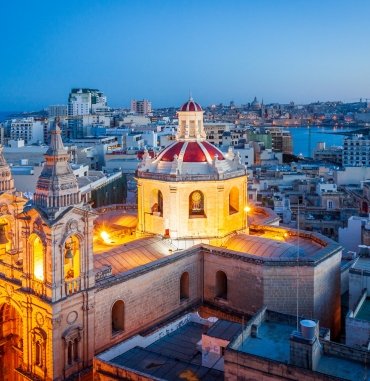IELTS Application Form
3.9KB
3.9KB


Trust us to guide you every step of the way with professionalism and care.
 Recognized Degrees – Maltese universities follow the European Bologna System, meaning your degree is valid across Europe and beyond.
Recognized Degrees – Maltese universities follow the European Bologna System, meaning your degree is valid across Europe and beyond. Affordable Education – Tuition fees and living costs are lower compared to many Western European countries.
Affordable Education – Tuition fees and living costs are lower compared to many Western European countries. Safe & Beautiful Location – Enjoy year-round sunshine, Mediterranean lifestyle, and cultural diversity.
Safe & Beautiful Location – Enjoy year-round sunshine, Mediterranean lifestyle, and cultural diversity. International Community – Thousands of international students choose Malta every year.
International Community – Thousands of international students choose Malta every year. Work & Career Opportunities – Students can work part-time, and graduates can explore EU job opportunities.
Work & Career Opportunities – Students can work part-time, and graduates can explore EU job opportunities. Gateway to Europe – Located in the heart of the Mediterranean with easy Schengen travel access.
Gateway to Europe – Located in the heart of the Mediterranean with easy Schengen travel access.Bachelor’s Programs: High school diploma + eligibility to enter university in your home country
Master’s Programs: Recognized Bachelor’s degree in a relevant field
PhD Programs: Master’s degree + research proposal
Language Proficiency:
English-taught: IELTS/TOEFL or Medium of Instruction (MOI)
Other documents: Passport, transcripts, CV, motivation letter, recommendation letters
Malta Government Scholarships (limited scholarships for international students)
Erasmus+ Mobility Scholarships
University of Malta Scholarships (for outstanding students)
External scholarships from international organizations
Non-EU students need a National Visa (Type D) for Studies. Requirements include:
Valid passport
Admission letter from a Maltese university
Proof of sufficient funds (~ €700/month)
Proof of accommodation
Health insurance covering stay in Malta
Completed visa application form
Students can work part-time during studies (usually up to 20 hours/week).
After graduation, international students may extend their stay for job-search opportunities in Malta or move within the EU for career prospects.
With a Maltese degree, you can also apply for EU Blue Card if you meet salary and skill requirements.
However, if you’re overwhelmed by your academic journey’s complexities, Destiny Globals can be your guiding light. In addition, please schedule a consultation with our experienced advisors to discuss your educational goals, from selecting the perfect program to crafting a winning application. Whether you seek undergraduate studies, postgraduate pursuits, or exam preparation guidance, Destiny Globals offers personalized support to help you unlock your academic potential. Lastly, don’t hesitate to take the first step towards success—book your consultation today!
Set up a meeting with us now, and we’ll work with you to make your study abroad ambitions a reality.
Yes ✅. Malta offers internationally recognized degrees, English-taught programs, affordable living, and a safe, welcoming environment.
Most universities require proof of English proficiency (IELTS/TOEFL). However, some may accept a Medium of Instruction (MOI) certificate if your previous education was in English.
Tuition fees: €1,000 – €6,000 per year (public) and €5,000 – €15,000 per year (private).
Living costs: €150 – €600 per month (accommodation, food, transport).
Yes. Students can work up to 20 hours per week during their studies, provided they have a valid work permit.
Yes. Options include:
Malta Government Scholarships
University of Malta scholarships
Erasmus+ and mobility funding
External scholarships through organizations
Non-EU students need a National Visa (Type D). Documents required include: admission letter, proof of funds (~€700/month), health insurance, and accommodation proof.
No. English is one of Malta’s official languages, and most programs are taught in English.
Yes ✅. Graduates can apply for job-search opportunities in Malta or move to other EU countries for career prospects. Skilled graduates may qualify for an EU Blue Card.
Most universities have two intakes:
Fall (October/November start)
Spring (February/March start)
Yes. Malta is one of the safest European countries, with a low crime rate and a friendly, multicultural community.
27 Old Gloucester Street
London, United Kingdom
Mon – Fri: 9:00 am to 5:00 pm
Sat – Sun: Closed
© All Rights Reserved by Destiny Global Solutions